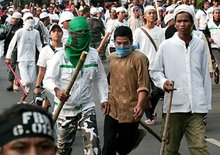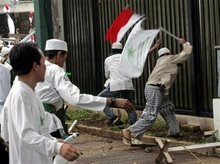
By Ali Kotarumalos
Associated Press Writer
Sun, Dec. 24 2006 09:44 AM ET
JAKARTA, Indonesia (AP) - Tens of thousands of police deployed at churches across Indonesia Sunday amid warnings by Western nations that Islamic militants may be plotting Christmas bombings.
A member of Indonesian police Bomb Squad search a diorama depicting the birth of Christ for suspicious objects ahead of Christmas eve services at the main cathedral in Jakarta, Indonesia, Sunday, Dec. 24, 2006. Tens of thousands of police were deployed at churches across Indonesia on Sunday amid warnings by Western nations that Islamic militants may be plotting Christmas bombings.
U.S. Christians: Peace, Hope for Persecuted on Christmas Indonesian officials downplayed the alerts, which have become something of a tradition themselves since Christmas Eve bombings at churches across the country in 2000 killed 19 people.
U.S. embassies in Jakarta and Australia warned the threat of an attack over the holiday season was "serious" and "credible" and that foreigners could be targeted, though it did not say what the alert was based on.
"The Australians and the Americans can say what they want, that is democracy," said Indonesia's police spokesman Col. I Ketut Untung Yoga Ana. "But up until now, we have not seen any frightening signs."
Nevertheless, 18,000 officers have been deployed at churches in the capital, Jakarta and tens of thousands more will be on duty elsewhere in the sprawling nation, he said.
Bomb squad officers planned to search Jakarta's cathedral for bombs and Christmas Eve worshippers at major churches would be frisked before they entered, he said.
The United States and its regional ally, Australia, have long posted generic warnings that terrorists are plotting attacks in Indonesia, but they routinely issue fresh bulletins ahead of the holiday season.
The warnings are not based on intelligence of a specific threat, but rather reflect a general belief that attacks by Muslim extremists are more likely over Christmas.
Since the 2000 bombings, militants from the al-Qaida-linked Southeast Asian terror group Jemaah Islamiyah have staged four major attacks. The deadliest was the October 2002 nightclub bombings that killed 202 people, most of them foreign tourists. The last attack was more than 14 months ago.
Indonesian officials do not like the terror warnings, saying they hurt the country's economy by frightening tourists and are unfair given the global nature of terrorism.
Indonesia is the world's most populous Muslim nation. About 10 percent of its 220 million people are Christian.
Copyright © 2006 The Associated Press. All rights reserved.
http://www.christianpost.com/article/20061224/24491_Tens_of_Thousands_of_Police_Guarding_Indonesian_Churches.htm














